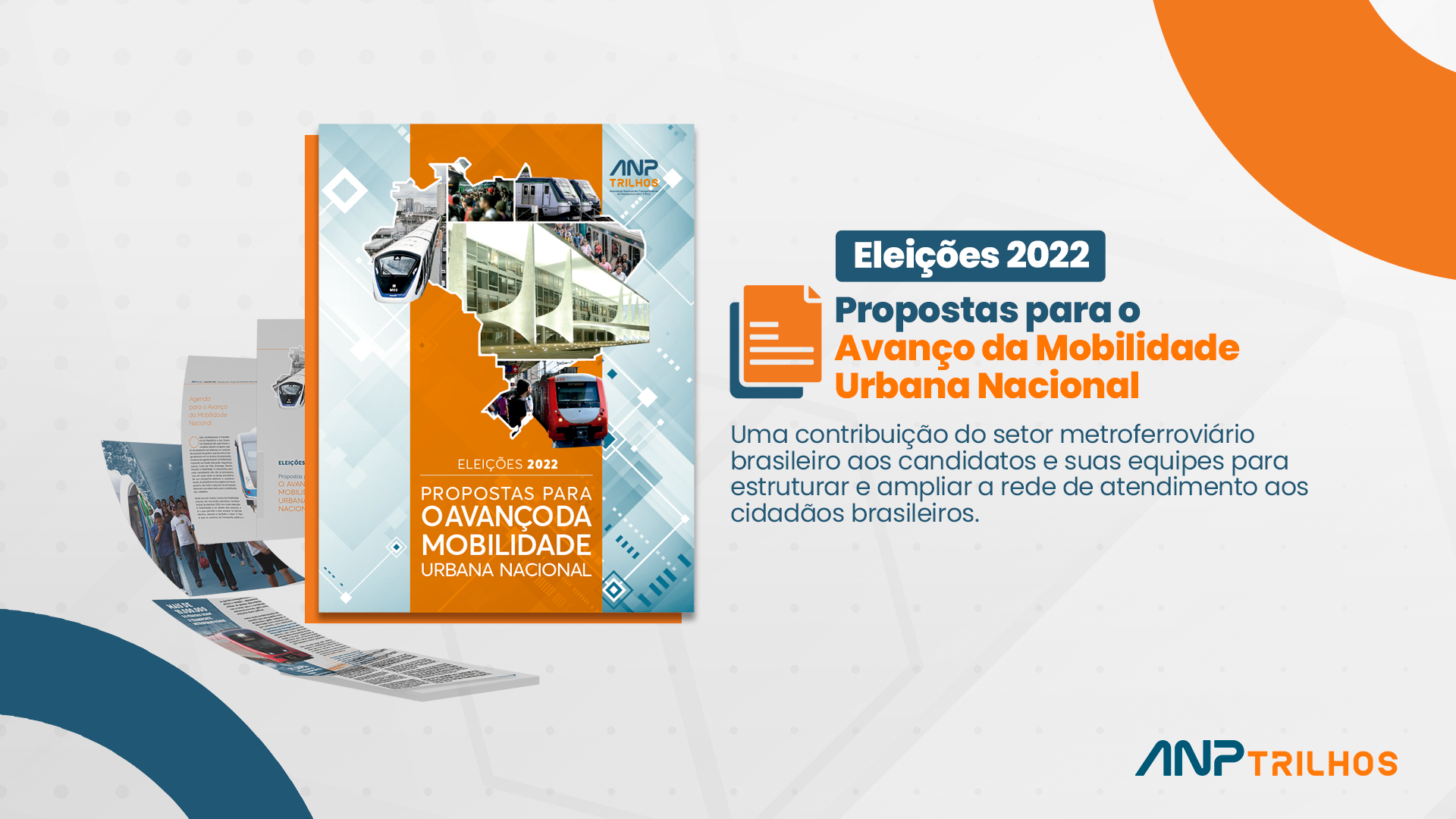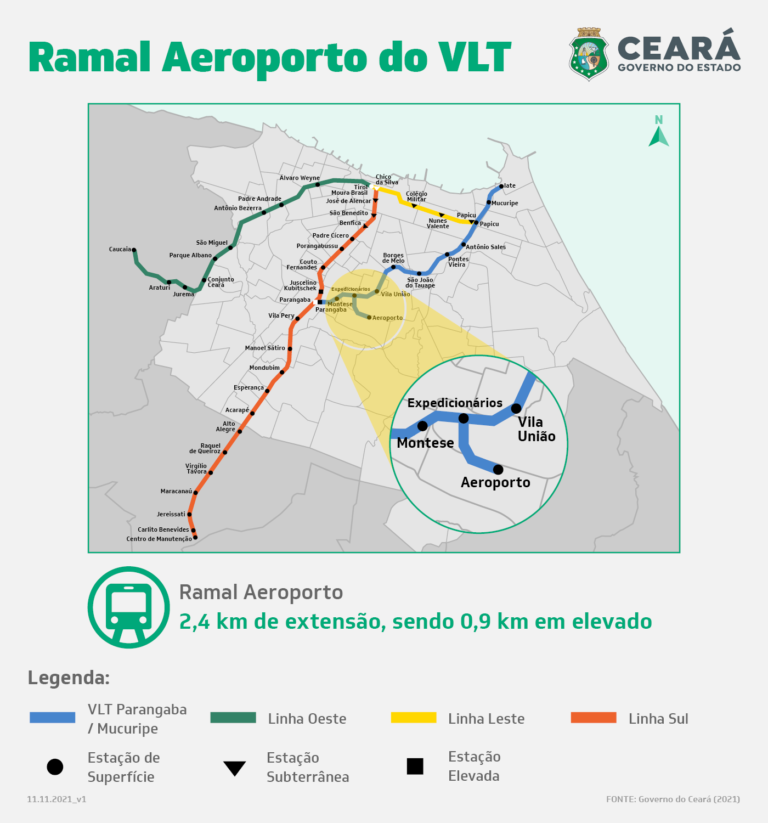Brazil has over 3 thousand kilometers of passenger transport systems on rails projects mapped for implementation. For these sections to be implemented, efficient public policies must be implemented by the government. Aiming to contribute to the development of the service network, the National Association of Passenger Rail Operators (ANPTrilhos) presents the document Elections 2022 – Proposals for the Advancement of National Urban Mobility, which exposes to President candidates f and state governments the proposals for the growth of the rail network, which currently has 1,105 kilometers of tracks. The mapped projects represent 3x the extension of the systems in operation today.
“The Brazilian metro-railway network has 21 systems, distributed in 11 states and the Federal District, covering less than 50% of the national territory. We are a country of continental dimensions that needs an integrated and efficient public transport network, like Europe, a continent with two million square kilometers more than Brazil and with 250 thousand km of tracks. We need to invest in public transport on rails, providing quick and safe travel to the millions of Brazilians who depend on this type of transport every day”, emphasizes Joubert Flores, Chairman of the Board of ANPTrilhos.
The document Elections 2022 – Proposals for the Advancement of National Urban Mobility presents four proposals for the growth of the metro-railway network: Reformulation of the Legal Framework for Urban Public Transport; Financing Policy; Metropolitan Transport Authority and National Plan for the Development of Passenger Rail Transport.
ANPTrilhos emphasizes that investing in the reformulation of the Legal Framework for Urban Public Transport will provide more legal security for projects, attracting investments for their development. Today, the sector has 56% of private participation and with the new legal framework it is possible to increase this representation to 75% in just 5 years. For this, the financing of costing and investments in infrastructure must be taken into account; quality and productivity; and the regulation of contracts, ensuring greater legal certainty and the Union’s participation in the role of inductor of the national urban mobility policy.
A Public Transport Financing Policy is also needed, as the current remuneration model is bankrupting the public urban transport system. The replacement of the remuneration model needs to evolve from the criterion of “number of passengers transported” to a system for “services provided” or “availability” – with the creation of an operational performance indicator, which will increase legal certainty, provide greater attractiveness to investments and will also encourage operators to invest in improvements and measures to reduce costs.
The Metropolitan Transport Authority is responsible for coordinating urban mobility and promoting structural projects to serve metropolitan regions. It is an active and successful governance model in several countries and will significantly contribute to having a network of urban trails structured to serve the population. The proposal is that, in Brazil, it is formed by the Union, states and municipalities, being responsible for long-term planning; the expansion of the transport network; modal integration; the reduction of overlaps between modes; tariff affordability; improving regulation; and attracting investments.
The fourth point that the document presents is the National Plan for the Development of Passenger Rail Transport, the basis for Brazil to invest in regional and interregional connections – a niche of high demand and low supply. The development of these lines has the potential to attract investment and is an opportunity to develop a strong industry; a new productive and professional chain, generating more jobs and income. One of the strategies is the initial interconnection, via passenger rails, of the 25 metropolitan regions with more than 1 million inhabitants each. Long-distance trains will strengthen users’ power of choice, in addition to regional air or road transport options. It will also propose guidelines for the formulation of a business model that is attractive to the market and will allow the occupation and use of land in regions not yet strongly developed and will enhance the social and environmental benefits characteristic of the passenger rail mode.
“Brazil today has more projects to be executed than systems in operation. This is an indication that we need to advance with sectoral public policies, to leverage the development of the sector, and the proposals presented by ANPTrilhos have exactly this objective. It is urgent that our candidates look at this important economic and social sector and present proposals to seek legal certainty in the market and attractiveness of investment, the only possible way to allow the advancement of urban mobility on rails in our cities and in our country”, highlights Roberta Marchesi, Executive Director of ANPTrilhos.
BANK OF PROJECTS FOR TRANSPORTING PASSENGERS ON RAILS
The survey carried out by ANPTrilhos shows that Brazil has more than 3 thousand kilometers of passenger transport on rails projects mapped. They are distributed in over 70 sections of subways, urban trains, light rail vehicles, regional and interregional trains.
The State of São Paulo concentrates the largest number of stretches, with more than 800 kilometers. The Federal District has around 500 km of passenger lines. In the State of Rio de Janeiro more than 330 kilometers of extension is mapped for implementation. While in Bahia, the projects total is more than 240 km in length. In Rio Grande Sul, there are another 85 kilometers of lines for implementation. These projects are added to others divided into different Brazilian regions and which can expand the service of passenger transport on rails in the country.
“These projects rely on studies that allow immediate progress in implementation. It is extremely important that candidates look at public transport differently, as it is used every day by the Brazilian population. Investing in the systems is to guarantee a legacy to the states and municipalities”, explains J Joubert Flores, Chairman of the Board of ANPTrilhos.
The document Elections 2022 — Proposals for the Advancement of National Urban Mobility is available on the ANPTrilhos website, in Portuguese — www.anptrilhos.org.br/eleicoes-2022-propostas-para-avanco-mobilidade-nacional





